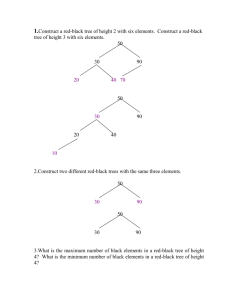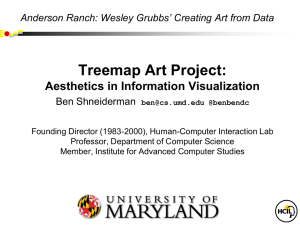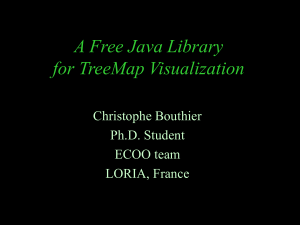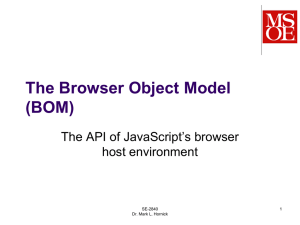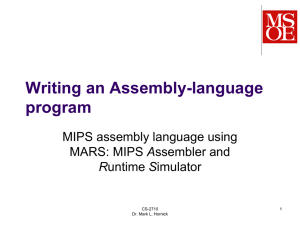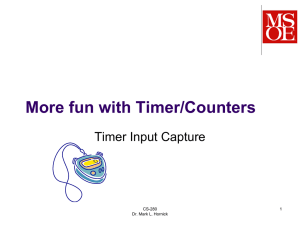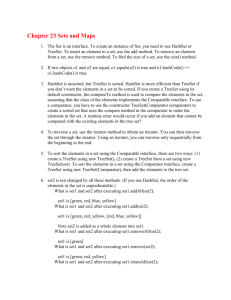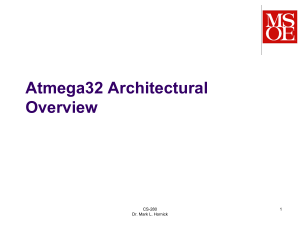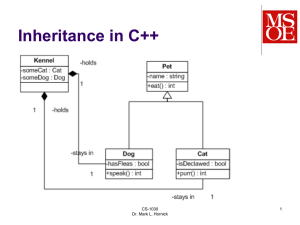TreeMaps
advertisement
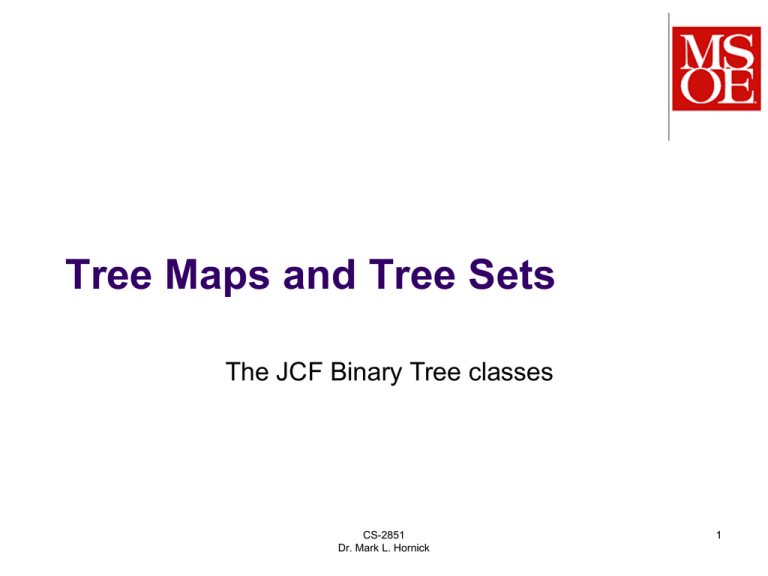
Tree Maps and Tree Sets
The JCF Binary Tree classes
CS-2851
Dr. Mark L. Hornick
1
Map definition review
A map is a collection in which each
Entry element has two parts:
a unique key part
a value part (which may not be unique)
Entry
key
value
Each unique key “maps” to a
corresponding value
Example: a map of students, in which each
key is the (unique) student ID, and each
(non-unique?) value is a reference to a
student object.
CS-2851
Dr. Mark L. Hornick
2
TreeMap :
The JCF implementation of a Binary Tree
TreeMap stores a Map in a red-black tree, ordered
by (unique) keys
public class TreeMap<K, V>
implements SortedMap<K, V>
extends AbstractMap<K, V>
Example:
TreeMap<Integer, Student> students;
//Integer: unique student ID number
//Student: student object
CS-2851
Dr. Mark L. Hornick
3
JCF TreeMap methods
Implements the Map interface
e.g. no iterator() method
But Map does define
Put(k,v) – insert a key/value entry into the Binary Tree
Remove(k) – remove the entry with the specified key
containsKey(k) – search for the entry with key k
containsValue(v) – search for an entry with value v
Could be more than one entry; each with a unique key
size(), equals(), clear()
CS-2851
Dr. Mark L. Hornick
4
The put() method is used to
insert elements
public V put (K key, V value)
/**
* Ensures that there is an element in this TreeMap object
* with the specified key&value pair. If this TreeMap
* object had an element with the specified key before
* this method was called, the previous value associated
* with that key has been returned. Otherwise, null
* has been returned.
* The worstTime (n) is O (log n).
*
* @param key – the specified key
* @param value – the specified value
* @return the previous value associated with key, if
*
there was such a mapping; otherwise, null.
*
*/
CS-2851
Dr. Mark L. Hornick
5
The containsKey() method determines
if the TreeMap contains an entry with a
specified unique key
public boolean containsKey (Object key)
/**
* Determines if this TreeMap object contains a mapping
* with a specified key.
* The worstTime (n) is O (log n). WHY???
*
* @param key – the specified key
*
* @return true – if this TreeMap object contains a
*
mapping with the specified key; otherwise, false.
*/
CS-2851
Dr. Mark L. Hornick
6
The containsValue() method
determines if the TreeMap contains an
entry with a specified value
public boolean containsValue (Object value)
/**
* Determines if this TreeMap object contains a mapping
* with a specified value.
* The worstTime (n) is O (n). WHY???
*
* @param value – the specified value
*
* @return true – if this TreeMap object contains
* at least one mapping with the specified value;
* otherwise, false.
*/
CS-2851
Dr. Mark L. Hornick
7
Some other Map interface
methods implemented in TreeMap
public V remove (Object key)
public V get (Object key)
Removes an entry with the specified key
Returns the associated value
Gets the associated value of an entry with the
specified key
public Set entrySet()
Returns a Set object reference
Which can be iterated
CS-2851
Dr. Mark L. Hornick
8
The two TreeMap constructors
(required by SortedMap)
public TreeMap( )
{
// comparator = null; key class implements
// Comparable interface
} // default constructor
public TreeMap (Comparator<? super K> c)
{
comparator = c; // c implements Comparator
interface
} // one-parameter constructor
CS-2851
Dr. Mark L. Hornick
9
The Comparator interface allows a
user of a class to override how that
class performs comparisons of keys
Interface Comparator<T> {
// Compares its two arguments for order.
int compare(T o1, T o2);
// Indicates whether some other object is "equal
to" this Comparator
boolean equals(Object obj);
}
For example, the String objects can be ordered by the
length of the string instead of lexicographically
CS-2851
Dr. Mark L. Hornick
10
Tree Sets
CS-2851
Dr. Mark L. Hornick
11
A TreeSet is an ordered Collection
in which duplicate elements are
not allowed
The TreeSet class has all of the methods in the
Collection interface
add, remove, size, contains, …
plus toString (inherited from AbstractCollection)
public class TreeSet<E>
extends AbstractSet<E>
implements SortedSet<E>, Cloneable,
java.io.Serializable
{
CS-2851
Dr. Mark L. Hornick
12
The TreeSet constructors
public TreeSet( )
// assumes elements ordered by
// Comparable interface
public TreeSet (Comparator<? super E> c)
// assumes elements ordered
// by Comparator c
public TreeSet (Collection<? extends E> c)
// copy constructor; assumes elements ordered
// by Comparable interface
CS-2851
Dr. Mark L. Hornick
13
The TreeSet class is implemented
with TreeMap in which all of the
values are the same
The TreeSet elements are the keys in the underlying map
A dummy object is associated with the value in the underlying
map
All the work is done by the underlying map
/**
* Initializes this TreeSet object to be empty.
public TreeSet( )
{
this (new TreeMap<E, Object>( ));
} // default constructor
CS-2851
Dr. Mark L. Hornick
14
